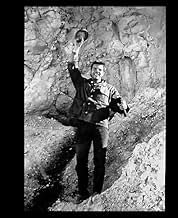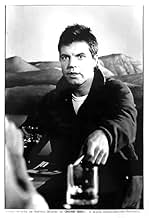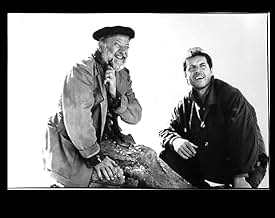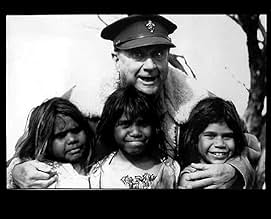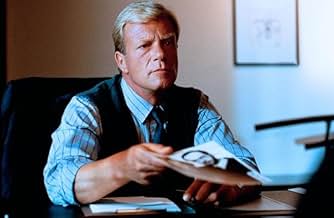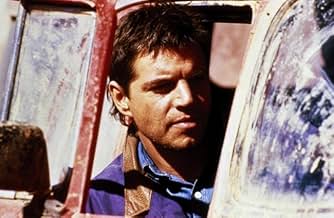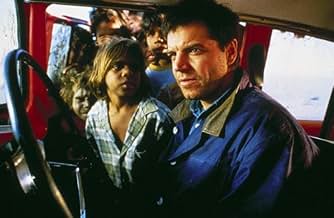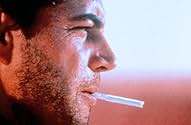Füge eine Handlung in deiner Sprache hinzuAn Australian cameraman inherits evidence his father witnessed a nuclear test's deadly impact on aborigines. His pursuit of justice risks angering powerful forces.An Australian cameraman inherits evidence his father witnessed a nuclear test's deadly impact on aborigines. His pursuit of justice risks angering powerful forces.An Australian cameraman inherits evidence his father witnessed a nuclear test's deadly impact on aborigines. His pursuit of justice risks angering powerful forces.
- Regie
- Drehbuch
- Hauptbesetzung
- Auszeichnungen
- 4 Gewinne & 6 Nominierungen insgesamt
Empfohlene Bewertungen
Based on a true, despicable act by the British government inflicted on indigenous and uniformed Australians, Ground Zero charts the cover up over the outback nuclear testing and subsequent fallout which took place in the 1950's.
This is a superb dramatisation which embellishes on the actual Royal Commission which took place in the mid 1980's.
Melding actual events with a fictional aspect may invite warranted scepticism, but the way in which Ground Zero plays out is compelling and superbly crafted with commendable attention to detail. It may not be the absolute truth but there's enough evidence to suggest certain action sequences weren't beyond the realm of possibility.
The acting of Colin Friels, playing the central character, cameraman Harvey Denton, whose fictional father was murdered for the damning footage he captured at the time, is ably supported by Jack Thompson and Donald Pleasance. Their impact on the quality of this film cannot be understated.
Track it down on YouTube, I doubt you'll be disappointed.
This is a superb dramatisation which embellishes on the actual Royal Commission which took place in the mid 1980's.
Melding actual events with a fictional aspect may invite warranted scepticism, but the way in which Ground Zero plays out is compelling and superbly crafted with commendable attention to detail. It may not be the absolute truth but there's enough evidence to suggest certain action sequences weren't beyond the realm of possibility.
The acting of Colin Friels, playing the central character, cameraman Harvey Denton, whose fictional father was murdered for the damning footage he captured at the time, is ably supported by Jack Thompson and Donald Pleasance. Their impact on the quality of this film cannot be understated.
Track it down on YouTube, I doubt you'll be disappointed.
An intelligent thriller is a rare thing these days, at least on the evidence of this well-intentioned but pedestrian story of nuclear paranoia and bureaucratic conspiracy, in which an innocent Australian cameraman uncovers a few radioactive skeletons in the closet of his country's atomic testing program. The Aussie government apparently has been hiding the details about native Aborigine victims of radiation fallout, but because the secret is out at the beginning of the movie there's no surprise and very little suspense: each new development in the already linear plot is introduced in sequence, with handy cues of ominous music to help viewers connect the dots. The script relies too much on convenient expository bulletins (television news broadcasts; telephone answering machine messages; home movies and so forth), and identifies too strongly with its hero, who like any unassuming TV cameraman is transformed into James Bond when under stress. A strong cast and attractive wide screen photography can't hide the wasted opportunity to expose an ugly true story and turn it into compelling fiction.
10Marta
Superior film which is based on a real-life incident. My husband and I kept catching the end of this film on cable, arrested by the spooky music and harsh photography, and were dying to see the entire movie since just seeing the end made no sense to us. When we finally did see the entire film, we both agreed it was one of the best that we'd ever seen and we've watched it many times since.
The film is set in Australia, which immediately takes it out of our American context and into an unknown place. A plane is found, still highly radioactive, buried in the desert; no one knows why but it's been there for over 30 years. There's a skeleton inside, also unknown. There is a human rights trial that runs through the entire film, which attempts to place the blame for nuclear testing within the Aboriginal lands on the Australian government, who are denying it. There are also a lot of Australian agents trying to find something that the hero's father hid long ago just before he "drowned"; something that would clearly show that the Australian government knew and in fact approved of the testing.
Colin Friels is marvelous as the protagonist/hero; he is acted upon, but he is ultimately aware of this and begins to turn the tables. Donald Pleasance is wonderful as a handicapped war veteran who Colin goes to for help in his quest to find out what happened to his father. Donald lives in a kind of geodesic dome structure in the middle of the Australian desert, which he's decorated inside and out with his own apocalyptic paintings.
Due to Donald's hints, Colin finally realizes who is behind his father's murder and he sets out across the vast Australian desert to an Aboriginal holy place. What he finds there is both an ending, as well as a possible beginning to another part of the story.
It is not, however, the end or solution to this ingenious movie, and I would not reveal that for the world. It's too good to spoil here. You must rent, buy or borrow this film and watch it yourself to see exactly how the movie ends, and you won't be disappointed. It is an incredible masterpiece, and I recommend it to everyone.
The film is set in Australia, which immediately takes it out of our American context and into an unknown place. A plane is found, still highly radioactive, buried in the desert; no one knows why but it's been there for over 30 years. There's a skeleton inside, also unknown. There is a human rights trial that runs through the entire film, which attempts to place the blame for nuclear testing within the Aboriginal lands on the Australian government, who are denying it. There are also a lot of Australian agents trying to find something that the hero's father hid long ago just before he "drowned"; something that would clearly show that the Australian government knew and in fact approved of the testing.
Colin Friels is marvelous as the protagonist/hero; he is acted upon, but he is ultimately aware of this and begins to turn the tables. Donald Pleasance is wonderful as a handicapped war veteran who Colin goes to for help in his quest to find out what happened to his father. Donald lives in a kind of geodesic dome structure in the middle of the Australian desert, which he's decorated inside and out with his own apocalyptic paintings.
Due to Donald's hints, Colin finally realizes who is behind his father's murder and he sets out across the vast Australian desert to an Aboriginal holy place. What he finds there is both an ending, as well as a possible beginning to another part of the story.
It is not, however, the end or solution to this ingenious movie, and I would not reveal that for the world. It's too good to spoil here. You must rent, buy or borrow this film and watch it yourself to see exactly how the movie ends, and you won't be disappointed. It is an incredible masterpiece, and I recommend it to everyone.
Interesting and involving as this film is, one feels something is missing from it. I really like this film, the photography out there in the dunes with those crystals (rocks) is a beautiful image etched in my mind. Friels and Thompson, who you don't see nearly enough in this, do us solid, and other performances grab us too, like the creepy Fachney, a seedy ASIO soy who even shows up as an extra in a commercial, Friels's character happens to be filming in the film's starting, a scene I loved, where the hot dog ad, all goes all to s..t Ground Zero just doesn't achieve full standing, or doesn't hit it's mark, and I think this largely is due to the screenplay structure, or not enough information was poured into the script. Regardless, it's still a riveting view. There's moments in this film, some quite creepy, that stay with me, like that nosey neighbour, prying on Friels all the time, through the gap of open door, and why is it, Friels has to use a boot to open his door of his apartment/work space, instead of just using his key. It's final scene really throws ya, where initially Friels lucks out again, with with those ASIO people. Quite a fine Aussie film, and one that should be seen, especially for people personally close or took a vested interest in the Maralinga affair, and those British A bombs. Great fitting music scores, which are eerily memorable.
I'm surprised to find that this film has been seen (and appreciated) in America. It wasn't all that successful in Australia, most people felt (like me) that it was a great plot idea let down by the writing (I also found Colin Friels' performance a little flat - and I thought the film went a bit heavy on the anti-American angle).
However, these reviewers don't seem to quite know the background to the film. Britain's first atom bomb was tested on Monte Bello island in the Indian Ocean in 1956, but the next series of tests were carried out at Maralinga in the South Australian desert, at the invitation of the Australian government. There was nothing secret about this, the government actually used the tests to promote itself as looking after Australia's security. Sounds very familiar! At the time the movie was made (1987), there was a big issue over the radiation levels that Australian troops had been exposed to during the tests, and the effects on their long-term health (much the same as for US troops during the Nevada tests.) There were also questions raised about how much effort had gone into evacuating the local Aborigines from the area both before and after the tests. This is the issue that forms the background to the movie, but it is really about drawing parallels between Australian subservience to Britain in the 50's and to the USA in the 80's, and just how much this is really in Australia's interest.
The debate back then was over the US satellite facilities at Pine Gap, today it is over support for the war in Iraq. The movie should have been topical and relevant, then and now, but it isn't because it is done with such a heavy hand. The scene where Colin Friels and Donald Pleasance are suddenly ambushed by US troops in the middle of the Outback is just stupid. The scene where he is making the hot dog commercial is supposed to be about the domination of American culture, but it doesn't work either. The line where he is talking to the rat in his kitchen when he gets home, probably looked good on paper, but should have been cut from the movie. The final scene should be brilliant, but isn't. When Colin Friels says, 'Hey, wait a minute...' he shouldn't say anything! His face should say it all.
My opinion - this film isn't great, but it could have been, which is why I found it so disappointing. Close, but no banana - damn, another Americanism!
However, these reviewers don't seem to quite know the background to the film. Britain's first atom bomb was tested on Monte Bello island in the Indian Ocean in 1956, but the next series of tests were carried out at Maralinga in the South Australian desert, at the invitation of the Australian government. There was nothing secret about this, the government actually used the tests to promote itself as looking after Australia's security. Sounds very familiar! At the time the movie was made (1987), there was a big issue over the radiation levels that Australian troops had been exposed to during the tests, and the effects on their long-term health (much the same as for US troops during the Nevada tests.) There were also questions raised about how much effort had gone into evacuating the local Aborigines from the area both before and after the tests. This is the issue that forms the background to the movie, but it is really about drawing parallels between Australian subservience to Britain in the 50's and to the USA in the 80's, and just how much this is really in Australia's interest.
The debate back then was over the US satellite facilities at Pine Gap, today it is over support for the war in Iraq. The movie should have been topical and relevant, then and now, but it isn't because it is done with such a heavy hand. The scene where Colin Friels and Donald Pleasance are suddenly ambushed by US troops in the middle of the Outback is just stupid. The scene where he is making the hot dog commercial is supposed to be about the domination of American culture, but it doesn't work either. The line where he is talking to the rat in his kitchen when he gets home, probably looked good on paper, but should have been cut from the movie. The final scene should be brilliant, but isn't. When Colin Friels says, 'Hey, wait a minute...' he shouldn't say anything! His face should say it all.
My opinion - this film isn't great, but it could have been, which is why I found it so disappointing. Close, but no banana - damn, another Americanism!
Wusstest du schon
- WissenswertesAfter this movie was made, this film was specially screened at England's House of Commons Parliament for the British Government of the day.
- VerbindungenFeatured in Ground Zero: An Important Story - Jack Thompson in Conversation (2008)
Top-Auswahl
Melde dich zum Bewerten an und greife auf die Watchlist für personalisierte Empfehlungen zu.
- How long is Ground Zero?Powered by Alexa
Details
Box Office
- Budget
- 7.000.000 AU$ (geschätzt)
- Laufzeit
- 1 Std. 49 Min.(109 min)
- Sound-Mix
- Seitenverhältnis
- 2.35 : 1
Zu dieser Seite beitragen
Bearbeitung vorschlagen oder fehlenden Inhalt hinzufügen

